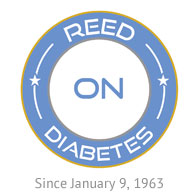This month, I reached out to Gary Scheiner, an expert in diabetes who lives with type 1. Gary is a treasure in our diabetes community. He has a degree in Exercise Science, is a Certified Diabetes Educator, the author of numerous books about living with type 1 (including my favorite ‘Think Like A Pancreas’), and is the founder of Integrated Diabetes Management. IDM works with type 1s on a variety of topics. I first met Gary over breakfast a decade ago when he traveled to Kansas City to speak at a JDRF event.
I contacted Gary for help with my post-cycling blood sugars. They typically stay in range or go low during a ride, but afterward, they spike significantly. I also wanted to solicit his thoughts on current and future closed-loop systems and blood meters.
Most IDM sessions are done remotely, using Zoom as the medium. Before the session, I completed a thorough online questionnaire that provided information about my diabetes lifestyle, medications, technology, and data sources.
Gary took the lead and immediately jumped into my blood sugar data (from Tandem’s t:source portal). While he was impressed with my tight control, his eyebrows were raised with the 15 manual boluses I give a day, many of them small micro-adjustments. I told him that was down from 17 several years ago. He chuckled and said with a few adjustments to my pump settings, Control-IQ would provide acceptable results, albeit not as tight as my current control. And give me some mindshare back.
I mentioned that I had taken walks with several closed-loop systems, including Loop, Medtronic’s 670g, and Tandem’s Control IQ. I found all of them to be outstanding at moderating basal rates but uber frustrating with post-prandial (post-meal) blood sugars. But Gary persisted and suggested moving to faster-acting insulin (like Fiasp), testing my basal rates (which I’ve done), and changing bolus and sensitivity ratios for Control IQ.
I reiterated that I had been down this path before and that I was comfortable making micro-decisions with the hypoglycemic protection of Basal-IQ. I said that I might even miss making the intraday adjustments. He then referenced Shawshank Redemption, a movie about prisoners who became so accustomed to their prison lifestyle that they had difficulty adjusting to the outside world when released.
While we laughed at the comparison, it put me on pause. Throughout my life with diabetes, I’ve been an early adopter of new approaches, even challenging medical professionals who argued against change because of my good A1C results. Like those in Shawshank, I’ve adjusted to the rules of diabetes.
How will I react if there is a total cure (*)? How will I behave if I get out of my diabetes box?
After rejoicing, I wonder how I’ll adjust to the change. After all, my brain has been trained to:
- translate food into carbs
- know when and how much insulin to infuse
- understand how technology works … and breaks
- select and work with the right medical professionals
- know when, how much, and how to fuel with exercise
- how to choose and work with medical insurance
- how to budget and spend money for diabetes care
Adjusting to not making these decisions will be different – and probably easier – than learning and making them. But still … there will be a gap. A loss. A change in identity.
And that sounds strangely like the group inside Shawshank. Here’s to a total cure and adjusting to a new normal free of diabetes.
(*) for me, a total cure is free of medications, technology, patient engagement, and medical professionals.


